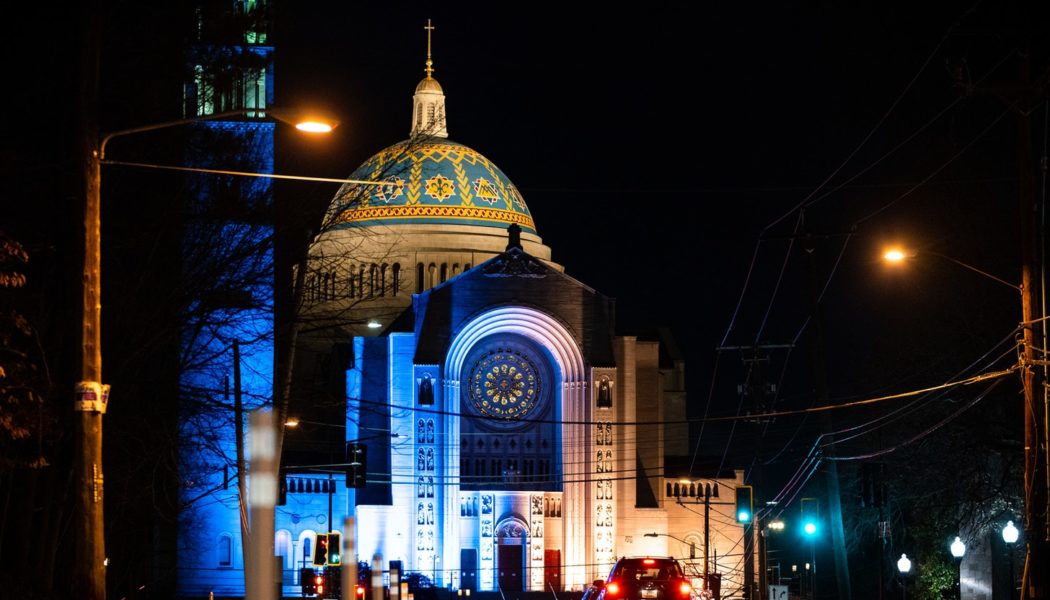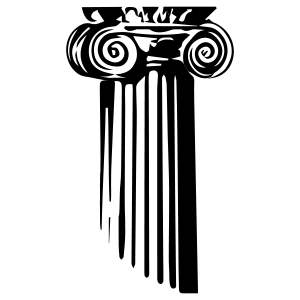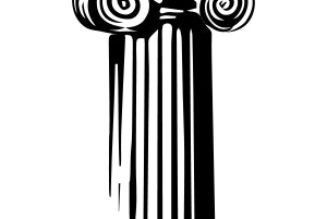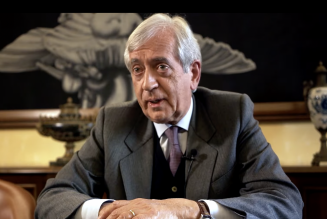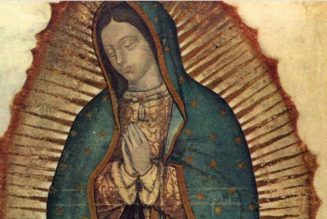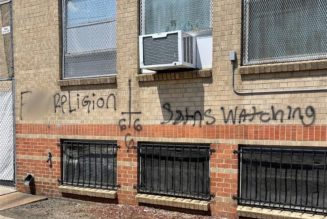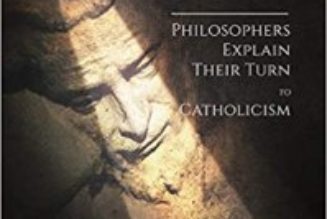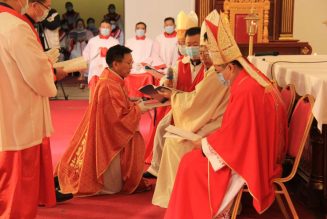Hey everybody,
Today is Shrove Tuesday, and this is The Tuesday Pillar Post.
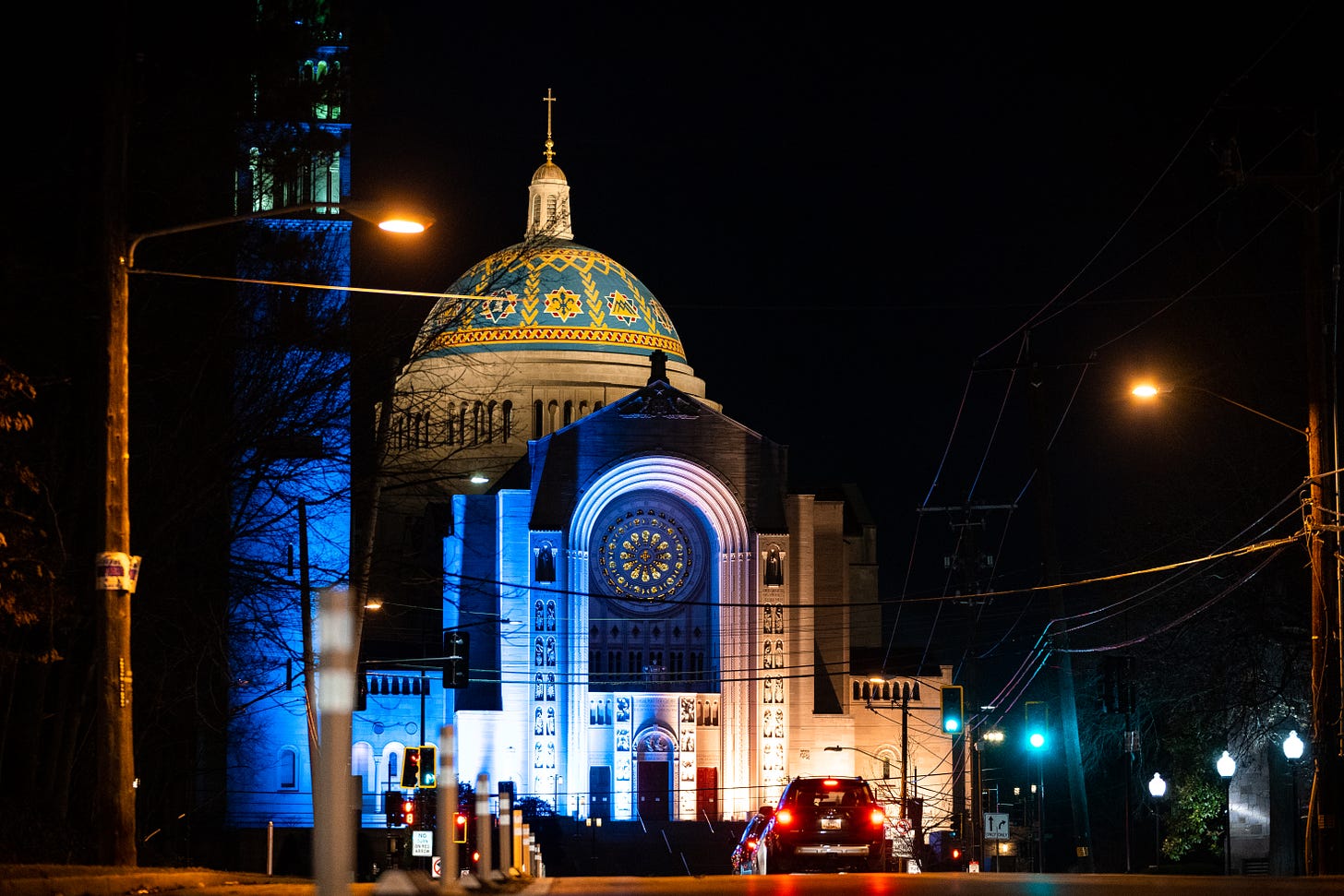
I’ll write today about Fat Tuesday, Lent, and the world’s oddest games of football — you’re going to want to stick around.
But first let’s do the news.
Looking east
Many Ukrainian Catholics this weekend had the unusual experience of a liturgical calendar that seemed to be synced up perfectly to the narrative of their own lives — in a way that probably points to the confounding mystery of the Lord’s Providence.
Much of the Ukrainian Catholic Church observed “Forgiveness Sunday” this weekend.
Imagine, if you can, that just days after your country is invaded by a neighbor bent on your destruction, your Church reminds you that God forgives by the same measure with which we forgive.
Imagine praying during an invasion an entire liturgical litany of forgiveness, in which you are expected to examine your conscience, forgive those who hate you, and ask your fellow parishioners for mercy.
Imagine preaching that God expects forgiveness, and calls us to it, to a congregation defending itself from invaders.
That can’t be easy. I talked with Ukrainian Catholics about forgiveness this week, and much of what they told me was extraordinary. Here’s just an excerpt:
Fr. Alexander Laschuk, a Ukrainian Catholic priest ministering in Toronto, told The Pillar that on Forgiveness Sunday…he’ll talk with parishioners, and with his children, about loving their enemies.
“I can say that loving your enemy is the hardest thing we are called as Christians to do. Absolutely the hardest,” Laschuk told The Pillar Sunday.
“And I tell people that loving your enemies means if you get to heaven and see Putin sitting there, you think ‘Wow, God is so great!’ And not ‘What the heck are YOU doing here?’”
“Forgiving doesn’t mean being a pushover. It means loving [adversaries] and desiring their salvation and seeing they too are created in the image of God,” Laschuk said.
“And in the specific case of Mr. Putin – this is something a lot of people obviously struggle with, even before this most recent move. But he says he is a Christian. I believe he thinks about his faith. And for me, that is something the Holy Spirit can work with. I tell people to pray for him.”
“The Holy Spirit can do incredible things and maybe, just maybe, he can speak to [Putin’s] heart and bring about that conversion that we seek — to see the dignity of the human person,” the priest added.
Read about the challenge, and the Providential timing, of this Forgiveness Sunday.
—
Patriarch Kirill, Orthodox primate of Moscow and All Russians, offered a prayer on Sunday which, by most estimates, was an attempt at theologically justifying, even baptizing, Russia’s military invasion of Ukraine.
Below I’ll delve more deeply into the role of the Russian Orthodox Church in the Russian invasion, but for now, give this a read.
—
The USCCB gives out millions in grants annually to church building and infrastructure projects in Eastern Europe. Most U.S. Catholics are probably unaware of that work. But your parish will probably have on Ash Wednesday a second collection to aid the Church in Eastern Europe — and if you want to know where the money goes, including how its emergency funding aims to help the Church in Ukraine — read our interview with Bishop Jeffrey Monforton.
In other news
The Vatican’s criminal court was back in session Tuesday, and judges rejected defense attorneys’ efforts to see the case thrown out. That means defendants in the case, including Cardinal Angelo Becciu, could take the stand later this month.
Cardinal Becciu told reporters he is glad the case wasn’t thrown out, and he is happy that he will soon get to defend himself in open court. We, too, are looking forward to that defense.
—
Pope Francis met on Saturday with emissaries from the Order of Malta, representing all sides in the ongoing conflict inside the order. The audience came after the pope announced he would spend time listening to all sides, and then personally decide how to handle a contentious constitutional revision process. Read all about it.
States and municipalities across the country are abandoning school mask policies — what with covid on the decline, and the midterm elections soon approaching. Catholic school mask policies are also quickly disappearing. But give you a sense of where they still exist, we built a cool interactive map — which, since things are changing pretty rapidly right now, we’ll update every couple days.
The map is cool — and it represents the first journalistic project undertaken by The Pillar’s managing editor Michelle La Rosa since she returned from maternity leave a few weeks ago. Michelle is back, and she’s got a new title— since we realized during her absence just how much of the logistics she really manages here at The Pillar.
Anyhow, check out the map, and, like I said, we’ll update it often, as things are changing quickly.
—
The bishop may face a challenge himself, as Stika has already admitted, in a series of 2021 interview with The Pillar, to many of the lawsuit’s claims.
Stika volunteered to The Pillar that he removed an investigator appointed to look into a rape allegation against a seminarian. And despite a series of serious sexual misconduct charges against that seminarian, the bishop sent him off for studies — to a seminary from which he then was dismissed for serial sexual misconduct.
Nevertheless, the bishop told his diocese Friday that he will “welcome a thorough examination of these allegations.” For a review of the claims, and the way they fit into what Stika has told The Pillar in on-the-record interviews, read our latest dispatch from Knoxville.
The patriarch’s test
When Patriarch Kirill of the Russian Orthodox Church spoke on Sunday about the Russian “Fatherland” and the Christian unity of Ukrainian and Russian people, most everyone paying attention heard a theological justification for Vladimir Putin’s invasion of Ukraine.
When the patriarch condemned “all outside actions” which threaten the apparent unity between Russia and Ukraine, it seemed equally clear that Kirill was talking about the West, about NATO, and perhaps even about the Patriarch of Constantinople, who has recognized an autocephalous Orthodox Church of Ukraine, which does not consider itself subject to the ecclesiastical authority of Moscow.
Kirill is generally regarded in the West as a Putin lackey, or perhaps a partner in crime, who is drawing from Orthodoxy to offer the theological and cultural vision of the Russkiy Mir, a kind of Russified Manifest Destiny that spurs Putin on.
That’s why, for example, Archbishop Borys Gudziak of the Ukrainian Greek Catholic Church has said the Russian Orthodox Church “walks arm-in-arm with an aggressive military assault on a democratic country,” and shares in the culpability.
Kirill’s remarks on Sunday have seemed to many like the high-water mark of his complicity with Russia’s incursion into Ukraine.
That’s not, of course, how everyone sees things in Russia, or even among the small number of Russian Catholics. There are Russians who argue that, whatever Kirill thinks about the ecclesiastical and regional politics, he has not distanced himself from Orthodox Metropolitan Onufriy, the Kyiv patriarch aligned with Moscow, who has condemned the war. They also argue that Metropolitan Hilarion, head of the Russian Orthodox Department for External Church Relations, opposed the prospect of war several times, with no direct rebuke from Kirill.
Those with this perspective aren’t exactly defending Kirill, but they are saying that it’s not fair to frame him as a propagandist for invasion, since his point about the unity of the Ukrainian, Russian, and Belarusian people could also be taken as opposition to fighting between “brothers.”
Agree or disagree with that viewpoint — and I suspect most readers of The Pillar disagree — it is a perspective on Kirill, and more than a few people hold it.
It now faces, though, a very serious plausibility test.
Concerns are growing that Russia is targeting civilians, perhaps even with deadly cluster bombs, to speed up its slow-going effort to take Kyiv, Kharkiv, and other key Ukrainian cities. Russian rockets have struck hospitals, residential neighborhoods, and apparently even a kindergarten, and the civilian death toll is rising. It seems likely to continue rising in the weeks ahead.
On Monday, the Holy Synod of Ukrainian Orthodox bishops — the Ukrainian Church in alignment with Moscow, under the authority of Kirill — asked Kirill directly to intervene for an end to the invasion.
“Your Holiness! We ask you to intensify your prayer for the long-suffering Ukrainian people, to say your First Hierarch’s Word on the cessation of fratricidal bloodshed in Ukrainian land and call on the leadership of the Russian Federation to immediately stop hostilities that are already threatening to turn into a world war.”
Kirill now faces a stark choice. He can heed the pleas of his own bishops — the bishops he says form an essential and integral part of his Church — or he can continue to offer the rhetoric nearly the entire world sees as cover for Putin’s invasion.
The patriarch must, effectively, decide between loyalty to his Ukrainian episcopal brothers, with whom he has been very eager to maintain communion, or loyalty to Vladimir Putin.
This war is, in many ways, a religious conflict. That mostly goes unseen in the West. But Putin is driven by a religious worldview, with Moscow, and him, at the center — on a kind of holy crusade to unite the Russian world, as he and Kirill see it.
With Kirill facing a choice, the religious character of this conflict is about to get all the more intense.
A holy Lent
I spent on Friday and Saturday several hours on the phone, enlisted as an unexpected go-between in a delicate situation.
I was contacted by a reader of The Pillar, on behalf of some Americans who have long-supported an orphanage in eastern Ukraine. The Americans wanted to help the orphanage residents take refuge in Poland, and were willing to be very generous to make that happen. But they’d hit a snag — the orphanage director was unwilling to sign off on the plan. There was good will from all parties, but there seemed also to be some frustration and misunderstanding on both sides.
I was asked to help sort things out. I have a few contacts in the Church in Ukraine, and the hope was that a Churchman — a priest or bishop — might be able to take an intermediary role, talking with the orphanage director, trying to understand concerns, and helping to work through any practical obstacles — to ensure that the children, some of whom had medical problems, would be safe and well-cared for as their country is at war.
I am not a social worker, an expert in international child custody laws, or an expert in Ukraine’s social service system. I’m a journalist, though, and I know some people, and I wanted to help, and so I found myself on a few phone calls.
During some of those calls, I found myself wondering why the Lord doesn’t have people for this kind of thing. People who are qualified and expert, and standing at the ready.
I was reminded, of course, that the Lord does have people, and that we, for better or worse, are them.
We, the baptized, the disciples of Christ, are sometimes called by Providence into situations in which we seem unprepared and with very little to offer. But that’s how the Lord works.
In the end, the children didn’t leave Ukraine. It became clear that wasn’t the best plan in this case — it would have created legal problems, some of which would have been quite complicated, and especially for the children who live in the orphanage but have parents who both love them and have legal rights in Ukraine.
Still, work was done to find the best possible placement for them, and medical care and nutrition, and the hand of Providence seemed at work as things unfolded.
And in the end, again, I reflected in humility that God asked me even to play a very, very small role in getting some of that sorted out. I reflected on the moral seriousness of the situation, and on the virtues the Lord requires of his disciples, if they are to be about his business, at least. In an honest self-assessment, I lack some of those virtues, and others need to be strengthened.
And here we have the gift of Lent.
Today, young priests in Ukraine are offering Divine Liturgy in underground bomb shelters, and bringing to front-line defenders the sacrament of the sick. Bishops in China will spend this Lent incarcerated, as they continue to face serious and ongoing persecution. Religious sisters and young priests in sub-Saharan Africa will face the ongoing prospect of kidnapping. Those are morally serious situations, faced with Christian hope, faith, and even joy.
Those are the situations I’ll be meditating upon this Lent.
Those are the Christian witnesses I’ll try to learn from. As we watch morally serious situations unfold for Christians around the world, I’ll borrow from St. Paul, asking the Lord to help me put aside timidity, or comfort, or frivolity — to “put aside childish things” — in order to be better prepared to receive the extraordinary graces God offers, and prepared to use them whenever, and however, the Lord calls.
There is much to learn from this Lent about the serious demands of the Gospel.
May Lent be a blessing, and a time of sanctification, for all of us.
But first, let’s talk about Shrove Tuesday.
Shrovetide football, pirates, and other fun
For hundreds of years, some British villages have observed an annual custom on Fat Tuesday — playing an insane game called Shrovetide football.
The game works like this: There are two two teams, sometimes very large, one ball, and two goals, usually on opposite ends of a village, sometimes miles apart. The goal is to get the ball into that goal. The rules: Don’t kill anyone. That’s pretty much it.
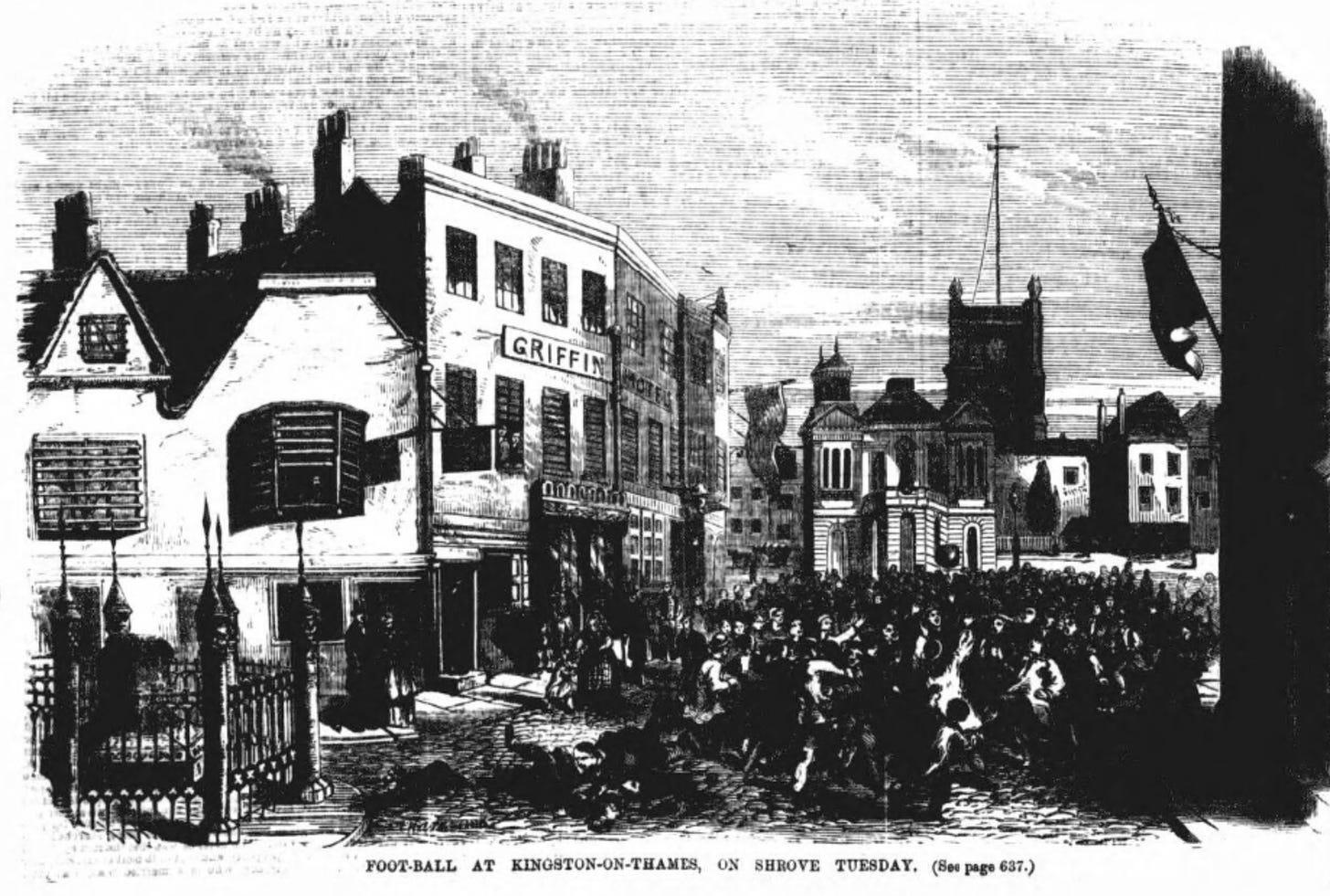
Not exactly sure what I mean? Well, check it out:
If violent mob football isn’t your game, perhaps the Shrove Tuesday Olney Pancake Race, a tradition said to have begun in 1445, is more your style:
—
If neither is for you, have you ever considered piracy?
A Texas congressman has the idea that it’s time for a resurgence of American piracy: He’s calling a for a plan that would allow Americans to operate as privateers, seizing the yachts, planes, and other “treasure” of Russian oligarchs around the world. To make it happen, the president would need to issue letters of marque, commissioning government-sponsored private pirates, just like we did in the War of 1812.
Seriously, what could go wrong?
Thank you
Ed mentioned to you on Friday that we’re working to grow The Pillar’s footprint, in coverage of the Church around the world, and that we’re aiming to build a new website and make some other technology improvements, while keeping the news we cover free and available to those who care about the life of the Church, but can’t afford to subscribe.
He mentioned that we’re aiming to increase our revenues for those purposes — especially to add more journalists to our team — and that we’ve begun talking about advertising revenue and other possibilities. Ed also mentioned that you, our readers, are the most important part of this community, and that your support has already meant so much to us.
Ed invited you to consider subscribing to The Pillar at a higher-than-usual rate — we know that some readers of The Pillar might be able to subscribe at $1,000 annually, making a generous commitment to the mission of The Pillar, and its growth.
Some of you have responded, generously, and we’re grateful. Thank you. And if you’re able to subscribe at a higher level, and you want to join The Pillar’s “$1k club” (we obviously need a better name) just let us know.
But, really, thank you subscribers at all levels to The Pillar, and thank you to those of you who are reading, listening to The Pillar Podcast, and sharing our work, even if you’re not in a position to subscribe.
This week, thanks to you, we’ll have a report from our new Ukrainian correspondent, and we’ve already begun working on plans for a much improved website. So thank you.
—
Have a blessed Lent. Be assured of our prayers, and please continue to pray for us. We need it.
In Christ,
JD Flynn
editor-in-chief
The Pillar
Join Our Telegram Group : Salvation & Prosperity
